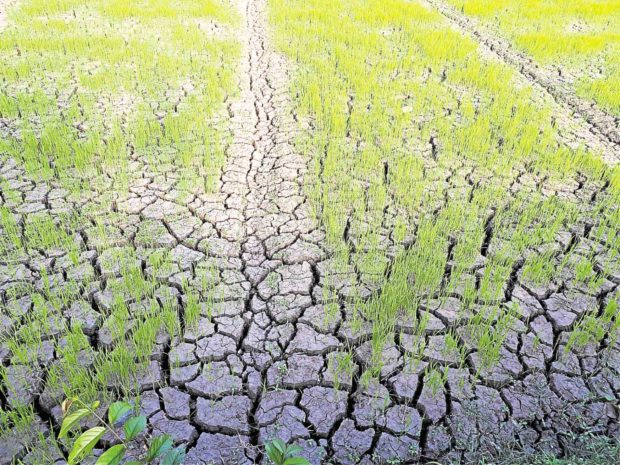
DRY SPELL Cracks appear on the soil in rice lands due to lack of water in irrigation canals in Libon town in Albay province.—INQUIRER FILE PHOTO / MICHAEL B. JAUCIAN
MANILA, Philippines — The majority, or 65 percent, of Filipinos noted a significant change in their respective area’s climate in 2023, based on the results of a Pulse Survey Research survey.
The survey was conducted on 1,200 adult respondents from September 10 to 14 through in-person interviews, with a ± 2.8 percent error margin at the 95 percent confidence level.
According to Pulse Asia, 65 percent of the survey’s respondents said that they experienced a “big change” in their respective areas’ climate in the past three years, while 24 percent said they were “undecided,” and 11 percent noted only a “small change.”
“These figures are about the same as those recorded in June 2022 both at the national level [at] 63 percent,” Pulse Asia noted.
Visayas saw the highest increase of respondents noticing big changes in their climate from 65 percent in June 2022 to 81 percent in 2023, followed by Metro Manila from 66 to 75 percent and Mindanao from 55 to 65 percent.
Balance Luzon, on the other hand, dropped by 11 percent from 66 to 55 percent as the percentage of undecided respondents increased by 14 percent from 24 to 38 percent.
Knowledge about climate change
Meanwhile, the majority of Filipinos claimed that they have little to sufficient knowledge about climate change.
Forty-four percent of respondents claimed to have “not wide but sufficient knowledge” of climate change nationwide, while 40 percent said they have “little knowledge.”
Only 11 percent of respondents said they have wide knowledge about the environmental crisis, while 5 percent said they have “almost no knowledge” if none at all.
Danger
Sixty-eight percent of the respondents said that they believed climate change is “dangerous” to the environment — a slight drop from the previous year’s 70 percent — while 21 percent were “undecided.”
Alarmingly, the number of respondents who said it was not dangerous rose from six to 11 percent.
READ: Climate change impact: Deadlier diseases
When asked by Pulse Asia about climate change’s effect on the country, 69 percent said it was “dangerous,” 21 percent said they were undecided, while 10 percent said there was no danger posed by the crisis.
READ: Don’t care about climate change? Wait until it hits you in the face
Meanwhile, 71 percent also said that climate change posed danger to their families, 17 percent said they were undecided, while 12 percent said that it was not dangerous.
Why do calamities happen?
The same survey also showed that while the number of respondents who believed calamities happen due to human-made environmental destruction remained in the majority, it dropped by 18 percent from 64 to 46 percent.
READ: 93% of Filipinos felt impact of climate change; optimism still prevails – SWS
Thirty-two percent (from the previous year’s 19 percent) said they believed that it was a natural phenomenon that occurs worldwide, while 21 percent (from the previous year’s 15 percent) said it was divine punishment or “God’s punishment or warning to nations turning to evil ways.”
Meanwhile, only 1 percent said they did not know.


